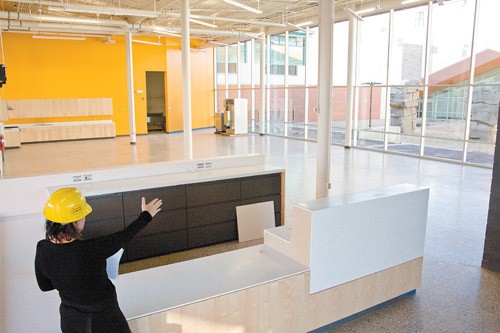Campus Health Services and Campus Recreation are in the process of designing a service fee that would fund many of the operational costs of the 55,000 square foot addition to the Student Recreation Center and the salaries of both student employees and health professionals.
In addition, if approved, the service fee would provide resources to enable the Rec Center to extend its hours until midnight.
While an amount for the proposed fee has not been specified, Campus Recreation and Campus Health have assembled a student fee review committee to survey the student body and find out whether students would be willing to pay a set fee in order to keep existing services.
“”Right now there is just no money,”” said Juliette Moore, director of Campus Recreation. “”We are in a precarious situation where we need this fee to cover the cost right now.””
Currently the recreation center employs more than 300 students annually through various programs. Without the creation of an additional fee, Moore said substantial cuts would be made to both student employment and hours.
“”Fees provide the stability we need for employees that work in this space,”” she said. “”We want to pay students an adequate wage. We want the money to go back into their pockets.””
Personnel costs currently make up 60 percent of Campus Recreation’s total budget.
Moore said the practice of instituting a fee for the use of a campus recreation center is widespread throughout the collegiate community.
“”When we compared the UA to 23 other peer institutions including all of the Pac-10 universities, 19 out of 23 have a fee in place for a recreation center,”” said Moore. “”The ones who don’t are generally looking to put fees in place.””
Campus Health is facing a similar situation. State funding comprises approximately 35 percent of its budget. A large chunk of that has been, and will continue to be, subject to budget cuts.
“”We can become more efficient, and we have. We can cut staff to the bone, and we have. But at some point and time, services will go away,”” said Kris Kreutz, director of administrative services for Campus Health.
Campus Health is responsible for a myriad of services at the UA, many of which are essential to the well-being of the student population, Kreutz said.
Kreutz said Campus Health is responsible for everything from urgent care to health education and counselor services — amenities that are provided at a far lower cost than outside providers.
“”The dollars we currently receive from the university go to keep the fee for seeing a counselor at $25. If you go into the community it’s $115,”” he said. “”We do 10 or 11 thousand visits a year in counseling alone.””
In a given year, 50 percent of students will use health services, Kreutz said.
Kreutz said that if a fee is not implemented, Campus Health will be forced to raise costs.
In terms of other options outside of an additional fee, both Moore and Kretuz said potential prospects are slim.
“”There is a state law that prevents us from opening up the doors of the Recreation Center to the outside community,”” said Moore. “”We are working with a finite population.””
Kreutz said Campus Health is also unable to draw in clients from the surrounding community.
A representative from the Arizona Students Association, a advocacy group on campus for public university students, said the library and several other departments have considered instituting a fee to help offset budget cuts, as well. However, ASA has not taken a stance on the issue.
“”Currently our board of directors hasn’t taken a stance on fees,”” said Elma Delic, vice chair of the board of directors of the association.
Both Moore and Kreutz said they are not sure when the survey will take place, but it must be done before February in order to get the fee on the Arizona Board of Regents agenda in March.
Moore said the student fee review committee will use a unique approach in order to get a wide range of feedback from the campus community.
“”What we are using is student-voice technology,”” said Moore.
Moore said the survey will be conducted through the use of iPod touches.
“”Members of the student fee review committee will give out i-touches where students will take a seven- or eight-question survey,”” she said.
The goal is to get at least 1,800 students across campus to participate in order to get a 99 percent confidence level in the results, said Moore.
Moore said the use of interactive technology has many advantages over an online survey.
“”The great other thing about this survey technology is that we know how many members of a certain segment of the campus community we survey,”” she said. “”We will be able to get a real good representation of students.””
Set to open Jan. 11, the addition to the Rec Center is predicted to boost the number of annual entrants from 600,000 to more than one million per year, according to entrance data from the facility.
However, without a new source of funding, officials from both Campus Health and Campus Recreation fear that there will not be money to pay the staff that will run the facility.
“”What we are saying is that if it (is) important enough for you as students, you need to be aware that our services will continue to be subject to budget cuts,”” said Kreutz. “”And as that happens a fee will have to replace those dollars.””









